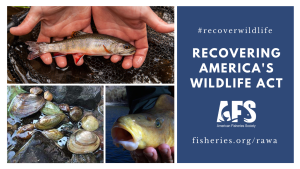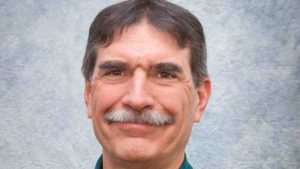



Recovering America’s Wildlife Act Video Contest
The Recovering America’s Wildlife Act is nearing the finish line. AFS is joining our partners in a social media blitz to mobilize personal networks around
American Fisheries Society Family of Websites:
Read our five journals and Fisheries magazine
Find thousands of unpublished agency reports and other information
Join us in Honolulu in 2024
Find an AFS Unit near you or in your area of specialty
Learn how to communicate the effects of climate change on fisheries
Summer internships for high school students
Explore our initiatives to increase diversity in the Society and in the fisheries profession
Find fisheries science products and services
Quick answers to common questions




The Recovering America’s Wildlife Act is nearing the finish line. AFS is joining our partners in a social media blitz to mobilize personal networks around


FOR IMMEDIATE RELEASE August 25, 2022 Contact: Beth Beard [email protected] 240-687-3761 ROBERT HUGHES RECEIVES THE AWARD OF EXCELLENCE FROM THE AMERICAN FISHERIES SOCIETY (Spokane, WA)
FOR IMMEDIATE RELEASE August 23, 2022 Contact: Beth Beard 240-687-3761 [email protected] FRIENDS OF THE CHICAGO RIVER RECEIVES PRESIDENTS’ FISHERIES CONSERVATION AWARD FROM THE AMERICAN FISHERIES
August 8, 2022 U.S. Fish and Wildlife Service MS: PRB/3W 5275 Leesburg Pike Falls Church, VA 22041-3803 via regulations.gov Re: Endangered and Threatened Species: Designation


July 13, 2022 – Online webinar Around the globe, advances in science and technology have enabled a thriving, environmentally sound, and sustainable marine aquaculture industry.


FOR IMMEDIATE RELEASE: July 5, 2022 Contact: Beth Beard Email: [email protected] Gary Whelan Elected Second Vice President of American Fisheries Society (Bethesda, MD) – Gary
Peter Turcik | Fisheries Managing Editor. Email: [email protected] Fisheries professionals from Central America, South America, and the Caribbean will gather in Cancun, Mexico on May 15–18,




Contact: Drue Banta Winters, 504-220-7868, [email protected] Caroline Murphy, 301-968-1903, [email protected] America’s Natural Resource Professionals Commend Passage of Recovering America’s Wildlife Act June 14, 2022




Drue Banta Winters | AFS Policy Director. Email: [email protected] Imagine a world where fisheries professionals have enough resources to keep fish from sliding to extinction.

